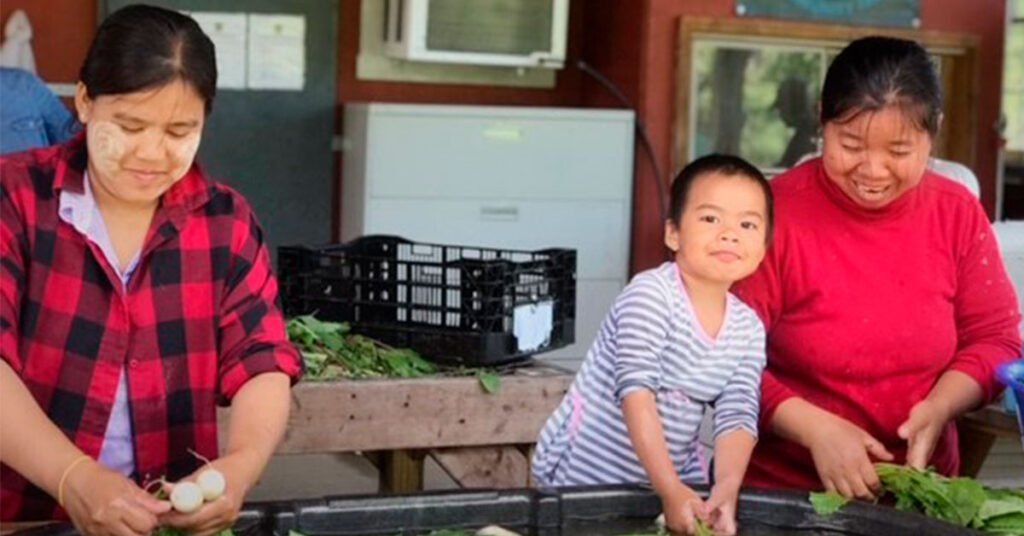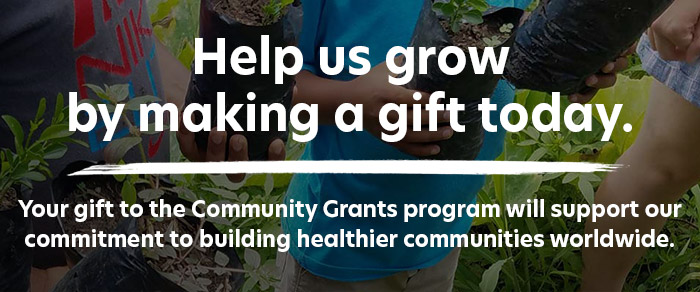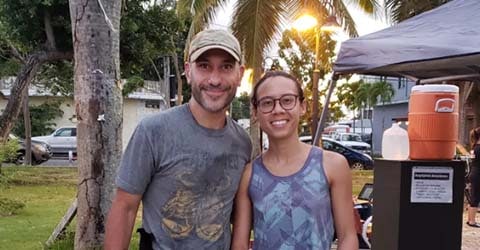
Transplanting Traditions Supports Refugee Farmers as They Grow Their Food and Their Community
The following is an article from a Community Grant recipient.
I grew up in the deep-rooted culture of the mountains of North Carolina. As a child, I spent countless hours at my grandmother’s elbow in her kitchen immersed in the food traditions that span generations in my family. My grandmother’s basement was lined with hundreds of Mason jars of preserves and my grandfather taught me to sprinkle salt and pepper on his watermelon and mash cornbread into a glass of buttermilk to eat with a spoon. As an adult, those memories have transformed from mundane to unique, as so many traditions of food and farming have fallen away from mainstream culture. But I long for that culture still, and I’m unbelievably lucky that my work has allowed me to fulfill that longing through the Transplanting Traditions Community Farm (TTCF).

Transplanting Traditions is an eight-acre non-profit community farm in the southern town of Chapel Hill, North Carolina and, as is fitting, farmers grow and cook southern standards like collards and okra. But instead of pairing them with cornbread and butterbeans, they’re mixed into spicy soups made of lemongrass and cassava or coconut milk and lime leaf, all grown at TTCF. If you walked our raised beds in August you would find woven bamboo trellises supporting vines of snake gourd and red seeds like entrails bursting from the knobby green flesh of bitter melon. Arrow hearted taro leaves as big as an umbrella and tiny clusters of spiky leaved bitter eggplant on six-foot stalks. Sesame and rice, jicama and papaya, herbs like pennywort, ginger and turmeric.
Transplanting Traditions is home to 14 distinct refugee farm businesses, 93% of which are managed by women. These refugees came from Burma, a long kite-shaped country about 1,000 miles north of the equator flanked by India, China, Laos and Thailand. In Burma, 65% of the labor force is involved in agriculture. As refugees fleeing civil war, the farmers who work at TTCF had to leave behind their farms, communities, histories, and culture. Although they came to the US as skilled farmers with a rich history and knowledge of agriculture, most came from villages without running water or electricity and due to a lack of “modern” skills, most find themselves in low-wage service jobs such as custodians and housekeepers. As a result, close to half of refugees have family incomes below twice the federal poverty level. Most Transplanting Traditions farmers work full-time during the night shift cleaning at our local university. They get off work at 7 AM and come to the farm where they stay and work until the late afternoon before returning to work again at night.

Transplanting Traditions provides agricultural micro-enterprise support to refugee farmers as they begin their own farm businesses. Our farmers sell through a Community Supported Agriculture (CSA) program as well as at local farmers’ markets. Over the years, TTCF farmers have earned over $710,755 in direct income through these sales. In addition, TTCF has a rigorous community food sovereignty program named Share a Share. Through this program, an average of 4,000 pounds of food grown at TTCF is donated to local food pantries and distributed to 1,288 refugee individuals on a bi-monthly basis, making the impact of TTCF extend deep into the community.

The farmers here say that Transplanting Traditions provides meaningful, joyful opportunities to increase income as well as to come together, rebuild, heal from trauma and celebrate culture and community. The farm is a respite. It is a place that provides meaningful work, income and food sovereignty. At the heart of the project is something very dear to me—we are recreating connections between people and their vital but increasingly-threatened cultures of food and farming, one seed at a time.
The T. Colin Campbell Center for Nutrition Studies (CNS) is committed to increasing awareness of the extraordinary impact that food has on the health of our bodies, our communities, and our planet. In support of this commitment, CNS has created a Community Grant initiative to empower sustainable food-based initiatives around the world by providing grants to enable innovative start-ups and to propel the growth of existing initiatives. Please consider making a donation to this great cause. 100% of your donation will go to support initiatives like the one you just read about in this article.
You Might Also Like
Copyright 2026 Center for Nutrition Studies. All rights reserved.
Deepen Your Knowledge With Our
Plant-Based Nutrition
Certificate
Plant-Based Nutrition Certificate
- 23,000+ students
- 100% online, learn at your own pace
- No prerequisites
- Continuing education credits





